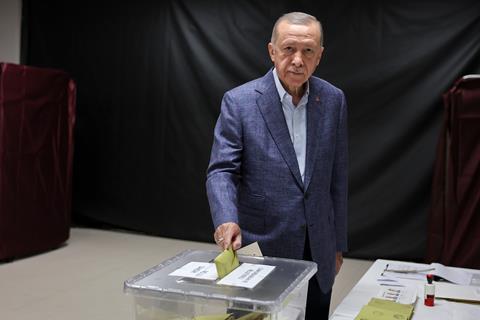
Much depends on the outcome of Turkey’s presidential election this weekend, many academics in the country say. At stake are issues such as the government’s appointment of university chancellors, the reinstatement of professors expelled during the 2016 state of emergency, control of academia by the Higher Education Council (Yök) and a brain drain growing up.
President Recep Tayyip Erdoğan, who has been in power since 2003, first as prime minister, then as president, took the lead in the first round of voting on May 14. His opponent Kemal Kılıçdaroğlu leads a broad opposition coalition that has seriously challenged Erdoğan’s rule for the first time in two decades. A coalition of right-wing parties that collected 5% of the vote in the first round may be king in this election.
Under Erdogan’s government, academic freedom has been progressively curtailed. In 2011, a group of scholars founded an alternative science academy, Bilim Akademisi, after the president changed the rules for appointing members of the oldest one, Tüba.
In 2016, following an attempted coup, Erdoğan declared a state of emergency during which he fired thousands of academics, accusing them of being linked to the coup. Among them, hundreds of signatories to the Academics for Peace petition opposing human rights violations in Turkish Kurdistan.
Erdoğan was also in charge of appointing university chancellors that year, making a number of controversial decisions. For example, in January 2021 he chose a former member of his party as chancellor of the top-ranked Boğaziçi University. The choice sparked major protests among students and faculty.
In 2017, the Turkish government removed evolutionary theory from school textbooks, after deeming it “old and rotten”.
Politicize universities
Caghan Kizil, a Turkish neuroscientist at Columbia University in the United States, says Turkey has gone through a “deep and deep-rooted transformation” over the past 20 years. “Appointment based on merit has shifted towards political criteria, and many teachers have been dismissed.”
University autonomy is the core of a call for a new higher education law collected in a November 2022 report drafted by a group of high-level Turkish academics, who say they have sent it to all candidates. “Universities should govern themselves and decide their own model for appointing their leaders and recalling them, if necessary,” he says. Canan Atilgan, chemical engineer at Sabanci University and president of Bilim Akademisi. “They should be free to use their budget and there should be mechanisms [for] internal democracy.’
A Tüba spokesman declined Chemistry World’s request for comment.
A specific requirement of the report is the abolition of the Higher Education Council and its replacement by “a new, independent and non-executive council”. Yök was created in 1981, after a coup, with the aim of bringing all universities under the control of a single organization. It has remained in place ever since. The board decides things like opening new departments and new degrees and how many staff members can be hired, Atilgan says.
Lale Akarun, professor of computer engineering at Boğaziçi University, says Yök’s purpose “is to make all universities uniform and control all ideas, all research, all hiring, all spending.” “If this continues, we will be equal in mediocrity,” he says. The council made the controversial decision to move all university classes online after the February earthquake. The government said this was so student dormitories could be used for earthquake victims, but researchers note that face-to-face classes were previously held after the earthquakes and some believe the move is to prevent students from organize politically.
Atilgan says many of the report’s requests are included in Kılıçdaroğlu’s manifesto, including replacing Yök and allowing universities to re-elect their own chancellors. The opposition candidate also said he would reinstate the scholars eliminated by emergency decrees. Erdoğan, on the other hand, has proposed putting a board of trustees at the head of all public universities.
“Winning the opposition would mean taking a breath of academic freedom,” says İsmet Akça, a political scientist who was expelled from his university after signing the Academics for Peace manifesto.
Some academics have pinned all their hopes on this election. “The friends who organized the resistance at Boğaziçi University are confident of an electoral defeat by Erdoğan,” says a Boğaziçi chemist who asked to remain anonymous for fear of reprisals. ‘There is no plan B. If this does not happen, it is likely that the younger generation [of researchers] they will emigrate and the older ones will retire”.
Akarun says she will continue to write, give interviews, protest and help with court cases. Akça notes that the academic union, Eğitim-Sen, is a potential site of resistance to the new changes that Erdoğan may introduce, should he win. “If something happens, it will be from the bottom up,” says Atilgan.
[ad_2]
Source link





